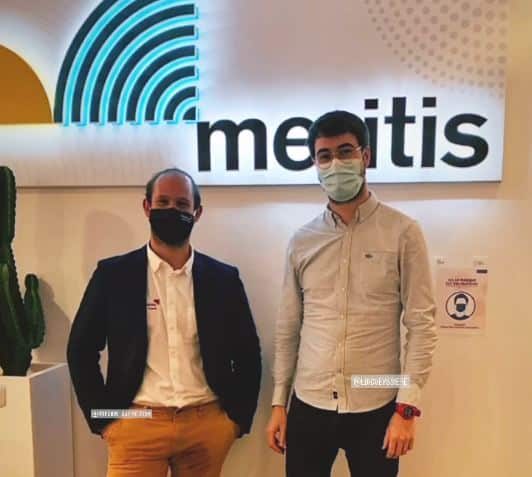
Today, data management in ocean racing is critical to improving performance and this is why Meritis and Sébastien Rogues, the skipper of the MULTI50 Primonial, decided to launch the ‘Bateau Qui Vole’ project.
The project aims to optimise the yacht’s performance by using real-time navigation data from Big Data, Artificial Intelligence and Machine Learning.
The target competition: the 2022 Route du Rhum.
A unique partnership between a data scientist and a professional skipper

The Bateau Qui Vole project began in 2019 following a meeting with Gilles Duret, the founder of Meritis, and Sébastien Rogues, the skipper of the MULTI50 Primonial.
Gilles Duret was keen to demonstrate how Meritis’ IT expertise could improve the performance of Sebastien Rogues’ trimaran.
Loïc Veyssière, a Data Scientist working at Meritis, was enamoured with the project and joined Sébastien Rogues’ team to make the yacht’s data the main lever to optimise its performance.
The goal: to enable Sébastien Rogues to anticipate, in real time, the yacht’s reactions based on the environment (wind speed, wave size, current, swell, weather conditions, etc.) and thus allow him to adapt and optimise each and every action during the race.
The challenge: to move from reactive navigation (sensitive to disturbances) towards a flexible and secure anticipatory style of navigation.
“This is a totally new project in terms of its type and goal. With the help of Meritis, we’re in the process of creating a brand new technology that will revolutionise competitive sailing and that will be deployed in real conditions as early as 2022 during the Route du Rhum race. I am very proud to be involved in this project, especially since the initial results of this great partnership are already highly encouraging,” explains Sébastien Rogues
Navigating towards innovation and performance with Data and Machine Learning
1 – Data collection
The trimaran is equipped with 30 sensors that collect a very large amount of raw data about the yacht’s environment. This data is then analysed and transcribed into the form of intelligent statistics in a dashboard accessible from a web portal.
This is a mammoth task as almost 1,758 hours of data and over 211 GB of data have already been processed.
Currently, the data structuring process is in place. As soon as new data appears, the platform detects the changes, and reworks, sorts, cleans and corrects the information.
The platform’s web portal is also highly advanced. It is now possible to select a segment (training sessions or races carried out by the skipper) and track the evolution of variables on a map in replay mode. This feature shows the boat moving on the map along with wind speeds, directions, angles of inclination, etc.
2 – Data analysis
The 2021 schedule has been organised around two complementary areas:
- Developing the web portal by adding more visuals, graphics and features based on the skipper’s needs.
- The R&D phase that will focus on the trimaran’s performance via data studies to understand the optimal speed based on wind angles and strength, analysing the effect of the swell and the impact of the autopilot on navigation.
These studies will provide new navigational insights.
25 recording points per second
1,758 hours of recording over three years
211 GB of data to process

Towards real-time analysis on the 2022 Route du Rhum yacht race2022
This major project will come to life in October 2021 during the ‘Transat Jacques Vabre’ yacht race. This race will prepare the trimaran for the 2022 Route du Rhum race, which means that the data will no longer be transcribed in real time on an application made available to the skipper.
Based on the recovered data flow, a real-time analysis will be provided to Sébastien Rogues, who will be able to anticipate every move based on the sailing conditions.
Our project in the press !
De nombreux médias parlent de notre projet.
